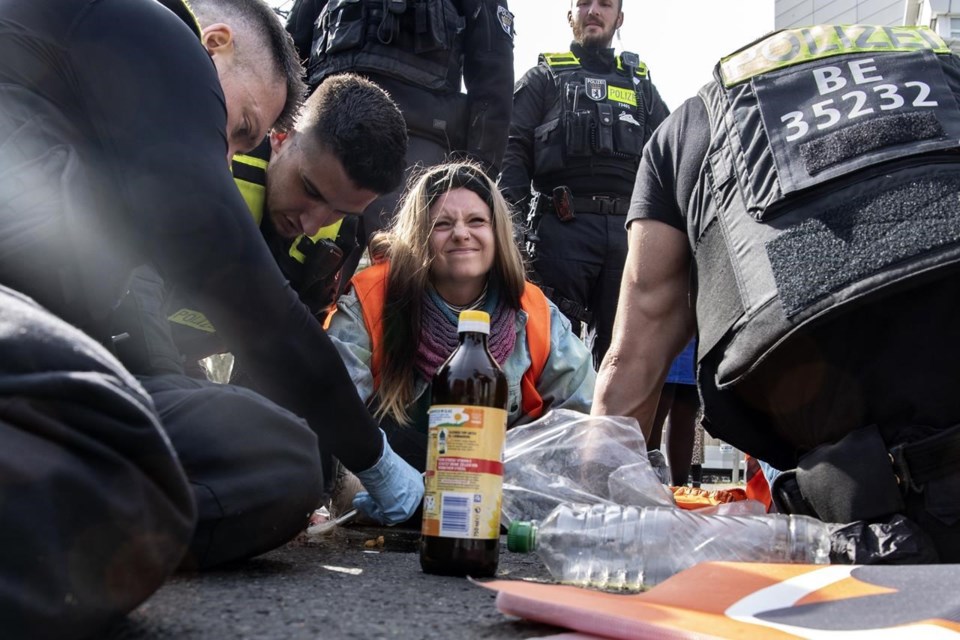BERLIN (AP) — Climate activists staged a 10th straight day of protests in Berlin, blocking key roads during rush hour and bringing parts of the German capital to a standstill Friday before being removed by police.
Members of the Last Generation group glued themselves to the road, causing a traffic jam for commuters driving into the city. The group wants to draw attention to the threat of global warming and the need for governments to step up measures to curb greenhouse gas emissions.
At a crossing in the north of the capital, many drivers waited patiently for police to clear the road, though some hurled abuse at the activists, calling them “terrorists” and “scum.” Several pedestrians applauded the protesters, giving them a thumbs-up, while one passerby offered them food and water.
Last Generation has acknowledged that its protests are provocative, but it argues that by stirring friction it can encourage debate within society about climate change.
“Sure, there are those who insult or criticize us,” activist Theodor Schnarr said. "But I've got the feeling that more and more people are coming to us on the streets and saying they think this is a good thing."
Schnarr said the group believes disruptive but peaceful protests are justified, because of the enormity of the climate crisis and the urgent need to tackle it.
“We have all the solutions. The German government just needs to implement them,” he said.
But Frank Silzle, a motorist who was inconvenienced by Friday's blockade, said that while he agreed with the group's aims, he objected to its tactics.
“Ultimately I think it's counterproductive, what they're doing,” Silzle said. “I understand their cause completely, but the way they're going about it is sadly causing a counterreaction within the population that is very, very harmful to the cause.”
Berlin police said that about 500 officers were deployed to deal with more than a dozen blockades Friday.
The protests come at an awkward time for the government, which is hosting an international climate meeting in the capital next week where it will push for other countries to do more to curb planet-warming emissions even as it faces criticism at home for failing to do enough.
German government spokesperson Christiane Hoffmann said the government “shares, in principle, the goal of drastically reducing CO2 emissions in order to stop and prevent climate change.”
“We just think the path taken by the climate movement, or some of these activists, is the wrong path for drawing attention to this,” she told reporters.
Hoffmann said the Petersberg Climate Dialogue, an event taking place in Berlin on May 2-3, remains focused on achieving the goal of the 2015 Paris Agreement of limiting global warming to 1.5 degrees Celsius (2.7 degrees Fahrenheit) compared to pre-industrial times.
Some German politicians have called for tougher police measures and sentences against activists for blocking roads. So far, most courts have either acquitted activists or issued them fines, though three Last Generation members recently received prison sentences ranging from three to five months in southern Germany.
The group plans to meet with Germany's transportation minister next week to discuss its demands. They include the introduction of a universal speed limit on German highways, a move that experts say would be a quick and cheap measure to cut emissions.
Meanwhile, activists from the organization Extinction Rebellion staged a protest Friday outside the Danish parliament in Copenhagen.
The protest's goal was “to pressure the government to bow to our simple demands for more protected nature and less industrial agriculture in Denmark,” the demonstrators said in a statement.
“If politicians still do not do what is clearly necessary, we will return and rebel again on May 12,” they said.
___
Jan M. Olsen in Copenhagen contributed to this report.
___
Follow AP's coverage of climate change at https://apnews.com/hub/climate-and-environment
Frank Jordans, The Associated Press



